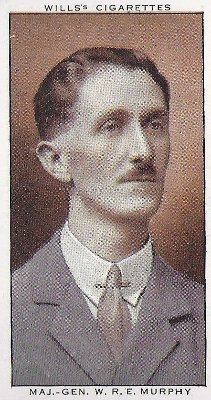W. R. E. Murphy facts for kids
Quick facts for kids
William Richard English Murphy
|
|
|---|---|

WRE Murphy, as depicted on a Wills' cigerette card.
|
|
| Born | 1890 Wexford, Ireland |
| Died | 1975 |
| British Army Irish Republican Army National Army (Ireland) |
|
| Rank | Major-General |
| Battles/wars |
|
| Awards | Distinguished Service Order Military Cross |
William Richard English-Murphy (born January 26, 1890 – died March 5, 1975) was an important Irish soldier and police officer. He was also known as W.R.E. Murphy. He served in the British Army during the First World War. Later, he joined the National Army in Ireland. He was a high-ranking officer during the Irish Civil War. After his military career, he became a top police official in Dublin and then for all of Ireland.
Contents
Early Life and British Army Service
William Murphy was born in Danecastle, Wexford, Ireland, on January 26, 1890. Sadly, he lost both his parents when he was only four years old. His grandparents, who were raising him, also passed away when he was still a child. William and his sister, Mae, were then raised separately by different relatives.
He was studying at Queens University Belfast when the First World War began. He decided to join the war effort. In 1915, he joined the South Staffordshire Regiment as an officer cadet. He fought in the Battle of Loos in 1915, where he was injured.
World War I Battles
Despite his injury, Murphy returned to fight in the Battle of the Somme in July 1916. This was one of the largest and bloodiest battles in history. By August 1918, he became the commanding officer of the 1st Battalion of his regiment. He reached the rank of temporary lieutenant colonel.
His regiment was then sent to the Italian Front. They were near the Piave River when the war ended on November 4, 1918. After the war, he officially retired from the British Army in May 1922.
Joining the Irish Republican Army
After returning to Ireland, William Murphy went back to his job as a teacher. At some point, he joined the Irish Republican Army (IRA). This group was a guerrilla organization fighting to end British rule in Ireland.
Irish Civil War Role
In December 1921, a peace agreement called the Anglo-Irish Treaty was signed. This treaty led to the creation of the Irish Free State. However, not everyone in Ireland agreed with the treaty. This disagreement caused the Irish Civil War to break out in June 1922.
Joining the National Army
In 1922, Murphy joined the new National Army of the Irish Free State. He was given the rank of general. When the Civil War started, he was put in charge of troops. Their mission was to take over areas held by the anti-Treaty IRA in Limerick.
Battle of Killmallock
From July to August 1922, Murphy was second in command at the Battle of Killmallock. His troops successfully removed the anti-Treaty IRA from their positions. However, some people criticized his slow approach to fighting.
After this battle, he was put in charge of Free State forces in County Kerry. He asked for more troops to help control the area. He tried to break up the republican groups in west Cork and east Kerry. These efforts did not have much success.
Challenges in Kerry
In October, Murphy ordered a curfew in Tralee. This meant people had to stay indoors from 10:30 PM to 5:39 AM. This was in response to ongoing attacks by guerrilla fighters.
In December, Murphy believed the anti-Treaty forces were almost defeated in Kerry. However, his hopeful prediction was wrong. The fighting continued.
Murphy also faced difficult decisions regarding captured fighters. He ordered that some captured republican fighters be sentenced. However, their sentences were later changed to prison time. This happened after the local IRA commander threatened to harm government supporters.
In January 1923, Murphy was promoted. He moved from his command in Kerry to a national role in the army. He was responsible for operations and organization across the country.
Police Career and Later Life
After the Civil War ended in May 1923, William Murphy left the National Army. He then became the first Irish commissioner of the Dublin Metropolitan Police (DMP). This was the police force for Dublin.
In 1925, the DMP merged with the new national police force, the Garda Síochána. Murphy became the Deputy Commissioner of the Gardaí. He held this important position until he retired in 1955.
Murphy also served as the president of the Irish Amateur Boxing Association for a time.
He lived with his daughter, Joan McMahon, in Ardee, County Louth, after his wife, Mary Agnes Fortune, passed away in 1958. William Murphy died on March 5, 1975.
 | Sharif Bey |
 | Hale Woodruff |
 | Richmond Barthé |
 | Purvis Young |

